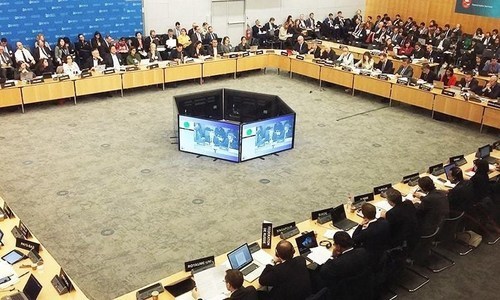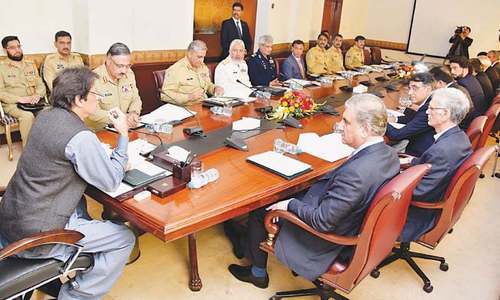On the directives of the federal government, the Sindh, Punjab, and Balochistan governments on Wednesday sealed or took over administrative control of several establishments run by the proscribed Jamaatud Dawa (JuD) and Falah-i-Insaniat Foundation (FIF), a day after the two organisations were listed as proscribed by the interior ministry.
The Ministry of Interior had also announced yesterday that 44 under-observation members of proscribed organisations, including Mufti Abdul Raoof and Hamad Azhar — the brother and son of Jaish-e-Mohammad (JeM) leader Masood Azhar, respectively — were taken in "preventive detention" for investigation.
According to sources within the capital administration, several mosques and madressahs within the control of the JuD and FIF were taken over by authorities in Islamabad.
Law enforcement agencies also took several people into custody, according to the sources.
Among the mosques and madressahs taken over in the capital were Masjid-i-Quba, Madni Masjid, Ali Asghar Masjid, Madressah Khalid Bin Waleed, and Madressah Ziaul Quran, the sources added.

Additionally, new khateebs (sermon-givers) and imams have been appointed by the federal Auqaf Department to replace the former ones.
The sources confirmed that the measures were taken in line with the implementation of the National Action Plan.
Crackdown in Rawalpindi
In Rawalpindi, a seminary, a hospital, and two dispensaries — located on the Chakrah and Adiala roads and run by the JuD — were sealed by the district government, sources within the deputy commissioner's office told DawnNewsTV.
According to sources, the crackdown against proscribed militant outfits, including the JuD, is being spearheaded by the district administration.
A list of all establishments run by the proscribed outfits has been created and the district government will take action against them. However, the source clarified that no arrests will be made during the crackdown.
Yesterday, seminaries run by the JuD in Chakwal — Madrassa Khalid Bin Waleed in the Talagang area and Madrassa Darus Salam on Chakwal’s Railway Road — along with their staff were placed under the administrative charge of the Auqaf Department.
Sindh follows suit
Also on Wednesday, the Sindh government took over the administrative control of 56 facilities including schools, hospitals, and madressahs previously run by JuD and FIF following the ban on the activities of both the organisations by the federal government.
This was stated by Adviser to Chief Minister Sindh for Information, Law and Anti-corruption Murtaza Wahab while speaking to media representatives.
Wahab said after the federal government took control of all the facilities run by the said banned outfits that fall within their jurisdiction, the Sindh government simultaneously took over the madressahs and public welfare facilities located in the province as well.
The adviser, however, clarified that the services provided by these schools, hospitals, and madressahs will continue to be available for the general public in line with government protocols.
He said the staff of the institutions will continue serving after due clearance and scrutiny as per the standards and procedures of the government.
Wahab said a total of 31 schools, 16 madressahs and nine hospitals across Sindh had been taken over by the provincial government. The break-up, by city, for the facilities having been taken over is as follows:
- Karachi: 10 schools, nine madressahs, and five hospitals
- Hyderabad: Three schools and one hospital
- Matiari: Two schools and one madressah
- Jamshoro: One school
- Mirpurkhas: Three schools and one hospital
- Sanghar: Four schools
- Tando Allahyar: One school
- Badin: Three schools and one madressah
- Tharparkar: One school, two hospitals and one madressah
- Naushahro Feroz: One madressah
- Shaheed Benazirabad: Two schools and three madressahs
- Qamber-Shahdadkot: One school
The adviser further said that committees have been constituted at the provincial, divisional (in case of Karachi) and district level to manage these facilities in the best interest of the public.
Wahab said the provincial committee will be headed by the secretary of the home department as the chairman, and the additional inspector general of the police Special Branch, special secretary for education, special secretary for health and the chief administrator for the Auqaf Department will be its members.
The divisional committee for Karachi shall comprise the city commissioner as its chairman, while Karachi's AIG police and the divisional heads of education, health and Auqaf departments will act as its members.
Similarly, he said the district committee will be headed by the deputy commissioner and the district heads of education, health and Auqaf departments will be its members.
These institutions will be run under the supervision of the Sindh government, which will also bear all of their expenses, Wahab said.
He appealed to the people to cooperate with the government, adding that anyone trying to create hurdles in the action will be arrested.
Balochistan govt makes similar moves
The government of Balochistan, too, launched a crackdown on Wednesday against organisations outlawed by the federal government.
According to Quetta Deputy Commissioner Tahir Zafar Abbasi, all assets in the city belonging to JuD and FIF have been taken over. "These outfits had four madressahs, schools and dispensaries in the city which have all been taken over by the district administration," he said.
The deputy commissioner also revealed that the boards previously placed on the facade of the buildings, with the names of the banned organisations prominently displayed, have been taken down and replaced with the district administration's signage.
Four ambulances recovered during the operation were handed over to the Civil Hospital Quetta, Abbasi added.
Sources within the Balochistan home department said it is expected that madressahs belonging to the banned organisations in Chaman, Pishin, and Hub will also be imminently taken over.
UNSC order for seizure of assets
The government had on Monday notified a 2019 order of the United Nations Security Council that would provide a legal basis for freezing or seizure of properties owned by individuals and organisations designated by the council as terrorists.
The order was issued to meet the requirements of the Financial Action Task Force (FATF) regarding the implementation of designation of persons and entities under the UNSC resolutions. Pakistan, despite making some progress in overcoming the shortcomings in its counter-terrorism financing and anti-money laundering regimes, continues to remain under the cloud at the global illicit financing watchdog.
After failing to adequately convince the FATF, Pakistan is now required to complete actions it has to take by the May timeline. The next FATF plenary is due in June this year.














































